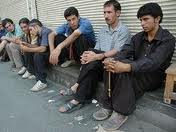Iran Feature: "Economic Crisis Shaking Foundations of Social Order" (Khajehpour)
 Interviewed by Tehran Bureau, Tehran-based business economist Bijan Khajehpour assesses the Iranian economy and the effect of international sanctions:
Interviewed by Tehran Bureau, Tehran-based business economist Bijan Khajehpour assesses the Iranian economy and the effect of international sanctions:
The SWIFT ban passed in March is an unprecedented measure in choking off Iranian banks from the global financial transfer system. How severely will the ban damage Iran's economy, from the government level to the private sector?
The SWIFT sanctions are severe, but they won't choke Iranian banks completely. First of all, the SWIFT sanctions are only targeted against those banks that have been black-listed by UN and EU sanctions. These are not all Iranian banks and there [are] a growing number of private Iranian banks operating in international transactions. Second, even before the SWIFT sanctions, the CBI [Central Bank of Iran] alongside major Iranian banks had developed Plan Bs and Cs to circumvent banking sanctions.
One of the strategies had been to keep funds outside Iran. The CBI had signed agreements with a number of national and private banks across the world to keep Iran's export revenues outside Iran. This is why the sanctions against the CBI were also very disruptive for the Iranian strategy.
Essentially, with that system in place, in many cases, Iran did not need to transfer funds from inside Iran, but could do so from accounts outside Iran, circumventing banking sanctions. Iran still has such accounts, especially in China and Turkey and Iranian imports are paid through so-called "back-to-back" LCs, i.e. an Iranian bank issues a letter of credit (LC) to the "executing bank" (e.g. a Turkish or a Chinese bank) and the executing bank issues an LC to the country of origin where the imports have come from.
The real impact of these sanctions is the fact that doing business is becoming more complicated and more expensive, but not impossible. At this stage, it is important to say two things:
(a) The Iranian business community has been confronted with sanctions for three decades and has always managed to find ways to circumvent them (this is the consequence of being a merchant nation for a couple of millennia); and
(b) The real problem at this stage is not the sanctions per se, but the unpredictability of behavior patterns of international players. An Iranian ship that gets stranded in a foreign port because the port authorities do not grant it permission to dock irritates Iranian businesses and the Iranian government more than the sanctions that generate temporary hiccups.
Therefore, the actual effect of the current sanctions is difficult to measure as the side effects are more damaging than the sanctions themselves. However, it is not a secret anymore that the overall impact of the sanctions is pushing a number of Iranian stakeholders to lobby for a political settlement of the nuclear issue....
The past six years of increasingly harsh sanctions from the U.N. and U.S. have taken a severe toll on Iran's economy, most visibly in rampant inflation and devalued currency. What are the human costs of these sanctions?
The social and human costs of the current economic developments are very high and only partly visible. We have a growing number of Iranian families under the poverty line (a recent report suggests that 60& of the workers are living under the poverty line). The most vulnerable groups are workers and civil servants.
Unemployment, underemployment and youth unemployment are all very high generating a degree of frustration among the youth. Crime is certainly on the rise, even though there are no official statistics, and then one witnesses phenomena such as the sale of body organs and other methods of generating additional income for the household. Increasing efforts to migrate to foreign countries can also be added to the list of social phenomena. The general preoccupation with economic issues has also undermined the Iranian culture as well as the society's ability to engage in the political developments --- i.e. a sense of de-politicization and frustration.
As I said, the current situation is not just a result of external sanctions. There are also internal phenomena that have contributed to the crisis. Fortunately, the Iranian society still provides for non-governmental social security networks (around families, mosques, religious foundations, etc.) which is easing some of the social tensions, but the overall trend is negative. At the same time, the current crisis is shaking some of the basic foundations of social order. The society as a whole, particularly the youth have no confidence in government, law and in clerical institutions. This loss of confidence translates into social behaviors such as disregard for the law, disrespect of cultural norms etc. which will further irritate Iranians with long-term consequences.

 Tuesday, April 24, 2012 at 8:20
Tuesday, April 24, 2012 at 8:20
Reader Comments